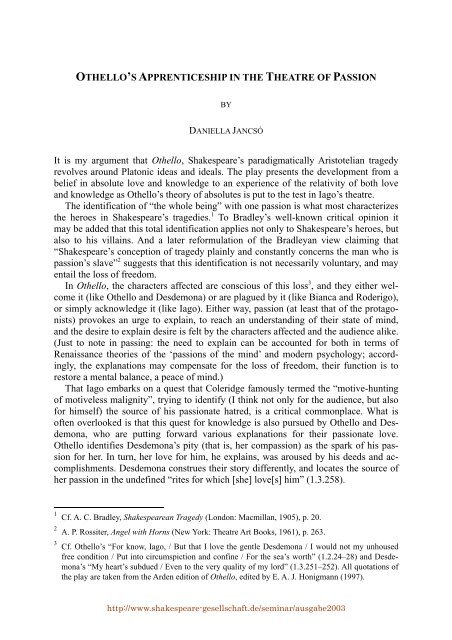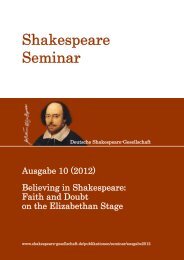Wissenschaftliches Seminar Online 1 (2003) - Shakespeare ...
Wissenschaftliches Seminar Online 1 (2003) - Shakespeare ...
Wissenschaftliches Seminar Online 1 (2003) - Shakespeare ...
Create successful ePaper yourself
Turn your PDF publications into a flip-book with our unique Google optimized e-Paper software.
OTHELLO’S APPRENTICESHIP IN THE THEATRE OF PASSION<br />
BY<br />
DANIELLA JANCSÓ<br />
It is my argument that Othello, <strong>Shakespeare</strong>’s paradigmatically Aristotelian tragedy<br />
revolves around Platonic ideas and ideals. The play presents the development from a<br />
belief in absolute love and knowledge to an experience of the relativity of both love<br />
and knowledge as Othello’s theory of absolutes is put to the test in Iago’s theatre.<br />
The identification of “the whole being” with one passion is what most characterizes<br />
the heroes in <strong>Shakespeare</strong>’s tragedies. 1 To Bradley’s well-known critical opinion it<br />
may be added that this total identification applies not only to <strong>Shakespeare</strong>’s heroes, but<br />
also to his villains. And a later reformulation of the Bradleyan view claiming that<br />
“<strong>Shakespeare</strong>’s conception of tragedy plainly and constantly concerns the man who is<br />
passion’s slave” 2 suggests that this identification is not necessarily voluntary, and may<br />
entail the loss of freedom.<br />
In Othello, the characters affected are conscious of this loss 3 , and they either welcome<br />
it (like Othello and Desdemona) or are plagued by it (like Bianca and Roderigo),<br />
or simply acknowledge it (like Iago). Either way, passion (at least that of the protagonists)<br />
provokes an urge to explain, to reach an understanding of their state of mind,<br />
and the desire to explain desire is felt by the characters affected and the audience alike.<br />
(Just to note in passing: the need to explain can be accounted for both in terms of<br />
Renaissance theories of the ‘passions of the mind’ and modern psychology; accordingly,<br />
the explanations may compensate for the loss of freedom, their function is to<br />
restore a mental balance, a peace of mind.)<br />
That Iago embarks on a quest that Coleridge famously termed the “motive-hunting<br />
of motiveless malignity”, trying to identify (I think not only for the audience, but also<br />
for himself) the source of his passionate hatred, is a critical commonplace. What is<br />
often overlooked is that this quest for knowledge is also pursued by Othello and Desdemona,<br />
who are putting forward various explanations for their passionate love.<br />
Othello identifies Desdemona’s pity (that is, her compassion) as the spark of his passion<br />
for her. In turn, her love for him, he explains, was aroused by his deeds and accomplishments.<br />
Desdemona construes their story differently, and locates the source of<br />
her passion in the undefined “rites for which [she] love[s] him” (1.3.258).<br />
1 Cf. A. C. Bradley, <strong>Shakespeare</strong>an Tragedy (London: Macmillan, 1905), p. 20.<br />
2 A. P. Rossiter, Angel with Horns (New York: Theatre Art Books, 1961), p. 263.<br />
3 Cf. Othello’s “For know, Iago, / But that I love the gentle Desdemona / I would not my unhoused<br />
free condition / Put into circumspiction and confine / For the sea’s worth” (1.2.24–28) and Desdemona’s<br />
“My heart’s subdued / Even to the very quality of my lord” (1.3.251–252). All quotations of<br />
the play are taken from the Arden edition of Othello, edited by E. A. J. Honigmann (1997).<br />
http://www.shakespeare-gesellschaft.de/seminar/ausgabe<strong>2003</strong>





